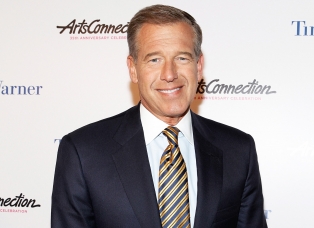NBC Can’t Quit Brian Williams, But Perhaps It’s Time to Drop the Anchor Act

How do you solve a problem like Brian Williams?
NBC News’ decision to send Brian Williams to the minors–in this case, MSNBC–is more like a solution in search of a solution.
No one can be happy with this outcome (other than Comcast bean counters, who at least don’t have another contract payout to deal with). Tapping Williams, who just five months ago was the marquee face of NBC News, to now settle in and read the headlines on MSNBC feels embarrassing to all involved.
“To be the face of breaking news? I didn’t think he could recover his credibility and I’m still not convinced that he can,” University of Maryland broadcast journalism professor Mark Feldstein told the New York Times.
That’s why Thursday’s announcement still seems more like a placeholder, much like the original plan for Ann Curry to stick around NBC after being fired from the Today show. Regardless of his tall tales and credibility gap, NBC could have found a way to keep Williams on Nightly News. But once the network decided to put Williams on a six-month sabbatical, that scenario was wiped out.
And yet, Brian Williams still needs NBC, just as NBC still needs Brian Williams.
For Williams, the MSNBC Solution still keeps him in the mix–something the star anchor, never one to shy from publicity, needs. A few months ago, a rival news executive suggested that Williams ought to take a break from the national scene and anchor a local newscast. But that sounds more like the premise for a TV show (perhaps a never-aired fourth season of HBO’s The Newsroom) or feature than it does a sound real-life strategy.
Williams knows the public has a short memory, and tends to forgive fallen celebrities–even ones that have served time in jail. Williams committed a journalistic crime, but it’s one the average viewer doesn’t see as befitting a TV death sentence. (Especially since, as NBC pointed out, most of Williams’ whoppers were told in late night, not on the newscast.) Williams already scored one key victory: He’ll still fill in for new NBC Nightly News anchor Lester Holt on breaking news when Holt isn’t available.
For NBC, shifting Williams to MSNBC helps jumpstart that failing news channel by giving it a marquee anchor and using him as the signal that it’s moving back to more of a pure news format. Rehabbing the cable news channel is as big of a priority as rehabbing Williams’ image: MSNBC’s primetime audience in May was 463,000 viewers and its total day audience was 299,000 viewers–its lowest tally since December 2007.
It’s a big gamble, and could backfire for both MSNBC and Williams. As CNN has learned, the “straight news” approach doesn’t necessarily work anymore, as viewers now turn to the Internet for breaking info. Can MSNBC’s ratings go even lower? Never say never.
If Williams wanted to protect his legacy, he might instead want to take a lesson from former NBC News president Michael Gartner, who fell from grace after the last major NBC News scandal. After taking responsibility for the 1993 Dateline NBC exploding truck controversy (in which producers on a story about the safety of General Motors trucks rigged one to blow up on camera), Gartner resigned and headed back to his native Iowa.
Gartner already co-owned The Daily Tribune in Ames, Iowa, and returned to serve as chairman and editor. It was there that Gartner rebuilt his career, ultimately winning journalism’s highest honor, the Pulitzer Prize, for editorial writing in 1997.
Granted, Gartner wasn’t a household name like Williams, and he wasn’t directly accused of planning the Dateline piece that caused the furor. Gartner had also spent decades in newspapers, and was a strong Iowa personality, so it was easy for him to return to home to do something he already knew.
But redemption came for Gartner in doing something more grassroots, less flashy and away from the Manhattan boardroom by getting back to journalism basics. He went from disgrace to a Pulitzer in four years. Not bad.
For Williams, if the MSNBC rehab doesn’t pan out, he may want to seriously consider flipping the news script as well. Anchor jobs aren’t what they used to be. Why settle for a diminished position in a career that’s already been diminished? It’s like moving from CDs to 8-track tapes when the rest of the world has gone digital.
That’s why, for his next gig, he really does need to get out from behind the anchor desk, and yes, even step away from the camera. Why not build something instead?
Williams could start by making a pledge to nurture a new generation of broadcast journalists. Get NBC to fund a ProPublica-style operation for TV, populate it with young reporters interested in his mentoring, and have the network broadcast some of those hard-hitting investigations that might help restore his credibility. Another road to salvation: Williams could produce documentaries that make noise and make a difference. (Maybe his old boss Jeff Zucker might buy one for CNN.) Hell, he might wind up with an Oscar.
Now that might appeal to Williams, who famously prefers the glitz and glamour that comes with being an anchor (including his countless late night appearances) than the kind of in-the-trenches reporting that, ironically, got him in trouble.
America still loves a comeback story, but it needs to be earned, not slow-jammed. And it needs to be seen. If a Brian Williams falls in the MSNBC, does it make a sound?







